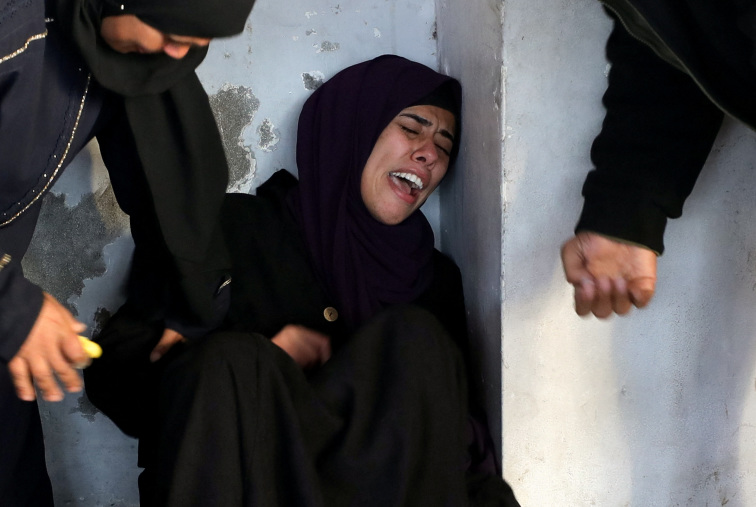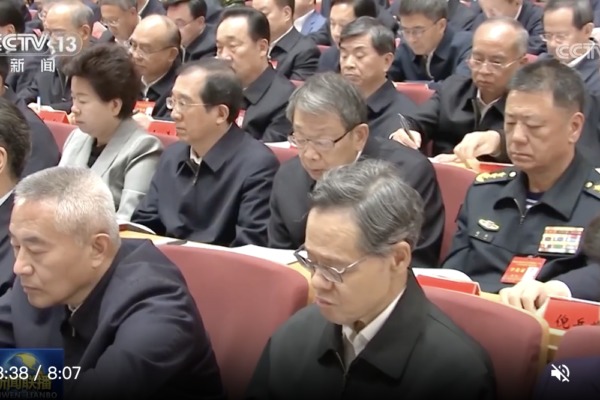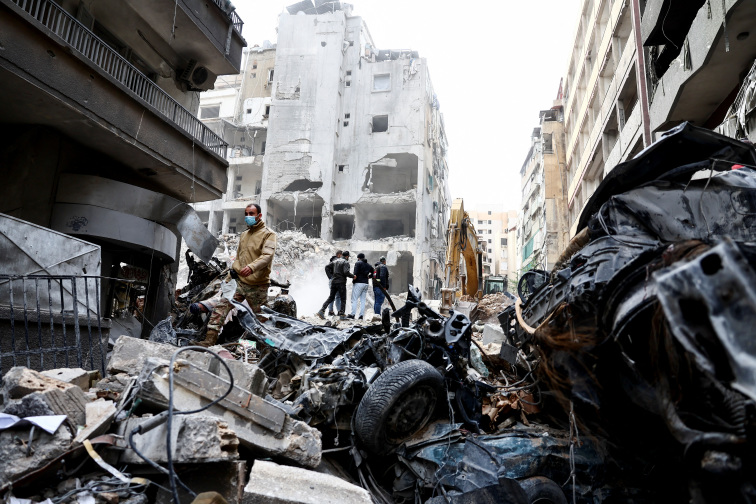Caption: Rumors from Beijing suggest plans to bring down the "New Gang of Four." (Illustration by People News)
[People News] On the evening of December 1, at 6 PM, the official account of the Political Work Department of the Central Theater Command published a news article titled "The 83rd Group Army Organizes Theoretical Training to Implement the Spirit of the Central Military Commission Political Work Conference." The report, filled with formulaic and empty rhetoric, lacked any notable highlights. However, one striking feature was the complete absence of any mention of "Chairman Xi," a name that has been ubiquitous in similar reports in the past.
The 83rd Group Army, part of the Central Theater Command, is headquartered in Xinxiang, Henan Province. Its predecessor was primarily the 54th Army, which was restructured during the military reforms in 2017. The recently deceased former Minister of National Defense, Liang Guanglie, once served as commander of the 54th Army. The current commander of the 83rd Group Army, Tan Hailin, previously held roles such as chief of staff of a division under the Guangzhou Military Region, commander of a division under the Southern Theater Command, and chief of staff of the Hong Kong Garrison. He was appointed as the commander of the 83rd Group Army in 2023.
The fact that this theoretical study report was published on the official account of the Central Theater Command’s Political Work Department indicates that it had the approval of senior leadership within the Central Theater Command.
The 61-year-old commander of the Central Theater Command, Wang Qiang, is a trusted confidant of Zhang Youxia. Wang has spent much of his career in the Air Force. In July 2013, he served as the deputy chief of staff of the Jinan Military Region Air Force. In January 2016, he was appointed deputy chief of staff of the Western Theater Command and concurrently chief of staff of the Western Theater Air Force. In July 2018, he was promoted to deputy commander of the Western Theater Command. In April 2020, he also assumed the role of commander of the Western Theater Air Force. In September 2022, he was promoted to commander of the Northern Theater Command, succeeding Li Qiaoming, who had been elevated to Army Commander. In August 2024, Wang was reassigned as the commander of the Central Theater Command.
On November 4 this year, Xi Jinping visited an Air Force brigade in Hubei Province, which falls under the Central Theater Command. Interestingly, instead of inspecting his loyal 31st Army in Fujian, Xi went to Hubei to inspect the Air Force, seemingly to make a public appearance, an action that seemed more forced than voluntary. This unusual arrangement attracted external attention at the time. With more signs emerging recently, it has become easier to understand the reasoning behind such an arrangement—it occurred within a theater command under the influence of Zhang Youxia.
In previous articles such as "He Weidong’s Orders Ignored: Which Military Branch Holds True Power?", "Does Beijing Garrison Still Pledge Loyalty to Xi Jinping?", "The 78th Army Xi Jinping Inspected Makes No Mention of 'Chairman Xi'", and "Xining Joint Logistics Support Forces Also Silent About 'Chairman Xi'", the author has tracked anomalies in the statements made by various theater commands and military branches during their studies of the CCP’s 20th Central Committee Third Plenary Session and the Central Military Commission (CMC) Political Work Conference. Phrases such as "Xi Jinping Thought," "Two Establishments," "Chairman Xi," and "Chairman Responsibility System," which used to be emphasized, are being downplayed or omitted entirely. Coupled with the recent announcement of an investigation into Xi's close ally, CMC Political Work Department Director Miao Hua, and rumors of associated senior military figures being implicated, it strongly suggests that Xi's control over the military has either significantly weakened or been lost altogether.
Why does this conclusion hold? At the closing of the CMC Political Work Conference on June 19 this year, both Zhang Youxia and He Weidong made emphatic declarations about implementing Xi’s decisions. Zhang emphasized the need to "follow Xi's political leadership of the military and strengthen absolute loyalty through ideological transformation," while He described Xi’s speech as "providing a scientific guide and action plan for building a politically robust military in the new era." He further emphasized the "decisive significance of the 'Two Establishments'" and urged the military to deeply grasp the political meaning of Xi leading them "back to Yan’an."
On September 2, He Weidong reiterated these points at a seminar for senior military officers, calling the study of CMC political work conference principles a "major political task" and stressing the importance of adhering to Xi’s decisions. He urged the military to "deeply understand Xi’s personal decision to convene the CMC Political Work Conference in Yan’an" and to "firmly implement the Chairman Responsibility System."
Logically, the rest of the military should have echoed these sentiments. However, this has not been the case. Instead, loyalty to "Chairman Xi" has been noticeably downplayed across theater commands and military branches. Such a shift could only have been initiated by senior CMC leadership, and not by Xi’s ally He Weidong. Instead, it points to Zhang Youxia, who has been rumored since the Third Plenum to have gained control over military power. With this perspective, the unusual deviations in military statements become much easier to understand.
On December 2, an article published on the military's official website titled "A Certain Army Regiment’s Deep Study and Implementation of the 20th Central Committee Third Plenary Session’s Spirit" further confirmed this hypothesis. The article, like others before it, made no mention of "Chairman Xi," referring only to "studying the spirit of the plenary session."
There has been speculation online that Xi Jinping personally ordered the arrest of Miao Hua as part of an anti-corruption effort in the military. However, this theory is unlikely for several reasons: Miao Hua was one of Xi’s few close allies in the military. If Xi had Miao arrested, it would be a foolish move akin to cutting off his own arm. The ongoing trend of downplaying loyalty to Xi, including the omission of "Chairman Xi" in official statements, suggests that it was not Xi but rather Zhang Youxia and his backers among senior CCP leaders who orchestrated Miao Hua’s removal. From the moment Miao Hua’s arrest was publicly announced, CCP officials with sharp political instincts likely sensed a shift in the political winds—one that will only become more apparent over time.
(Original publication by People News)










News magazine bootstrap themes!
I like this themes, fast loading and look profesional
Thank you Carlos!
You're welcome!
Please support me with give positive rating!
Yes Sure!